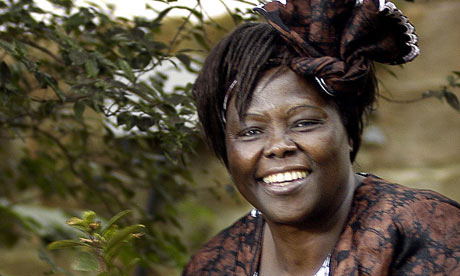When Wangari Maathai, a Kenyan known for her work in human rights and environmental conservation, including efforts to fight deforestation, won the Nobel Peace Prize last month, many took note that the Nobel Committee had evidently expanded its notion of “peace.” “Peace on earth depends on our ability to secure our living environment,” it proclaimed, seeming to embrace an extended concept of peace as “human security.”

Wangari Maathai. Photo: Gianluigi Guercia
More probably, the committee intended to highlight scarcity of renewable natural resources as an important cause of war. Their statement, it is true, didn’t deal with that issue directly, but Maathai herself said that “the environment is very important in the aspects of peace because when we destroy our resources and our resources become scarce, we fight over that” — an idea that was widely endorsed in news coverage of her award.
In fact, speculation about “water wars” and other apocalyptic scenarios lacks solid foundation. Some studies find a relationship between low-level conflict and scarcity of resources like arable land, forests and fresh water, but others do not. In any case, this link is trumped by poverty, political instability and a region’s history of conflict. Researchers haven’t closed the book on the question, but the most dramatic scenarios can be dismissed.
The lack of fresh water has been suggested as a particularly important factor in conflict. Boutros Boutros-Ghali, the former United Nations secretary general, is one of many officials who predicted in the early 1990s that “the next war will be over water.” Since then, we have witnessed major wars in Afghanistan, Congo, Iraq and elsewhere with no obvious link to water shortages.
Scarcity of fresh water is one of the world’s major health problems and constrains economic development in many parts of the world. But that is not a “water war” unless we radically redefine our concepts of war and peace. Countries that share a river appear to have a slightly higher probability of low-level conflict over and beyond the simple fact of being neighbors. Such countries also seem to cooperate more. There are hundreds of international agreements regulating the use of shared water resources, but one is hard put to name a single case where a conflict over water led to large-scale violence.
What about scarcity of land? Population growth, deforestation, soil erosion and migration can increase pressure on arable land. If such conflicts follow ethnic or religious lines, they may lead to local conflict. However, the probability that such conflicts will escalate to major violence is low.
Population pressure and scarce land resources were for a while standard explanations in the media for the civil war and the subsequent genocide in Rwanda in 1994. Today this conflict tends to be interpreted as more of a traditional ethnic power struggle. Statistical studies of civil war also indicate that countries with high population density or high population growth are no more prone to civil war. Some even argue that population growth stimulates economic growth and thus indirectly reduces the risk of civil war.
Recently, attention has to some extent turned away from resource scarcity and toward the problems faced by countries endowed with abundant natural resources. In Sierra Leone and Angola, rebels have financed their operations by dealing in “blood diamonds,” and in Colombia and Afghanistan drugs have played a similar role.
Once again, though, we should be wary of premature generalization. In Botswana, diamonds have created the economic basis for the closest thing we find in sub-Saharan Africa to a democratic welfare state. The impact of the so-called “curse of natural resources” is itself highly dependent on economic and political factors, as well as the nature of the neighborhood.
Environmental destruction and scarcity of renewable resources can present a danger to life and livelihood in many third-world countries. But these hazards are not primarily linked to a danger of war. Exaggerating the security aspects of environmental decay hardly helps our efforts to overcome the negative effects of resource scarcity.
Wangari Maathai and the Green Belt Movement have done pioneering work for environmental conservation in Kenya. But her work for democracy and human rights may well be seen as a more substantial contribution to peace than her tree-planting.
This text was published in the International Herald Tribune November 22, 2004